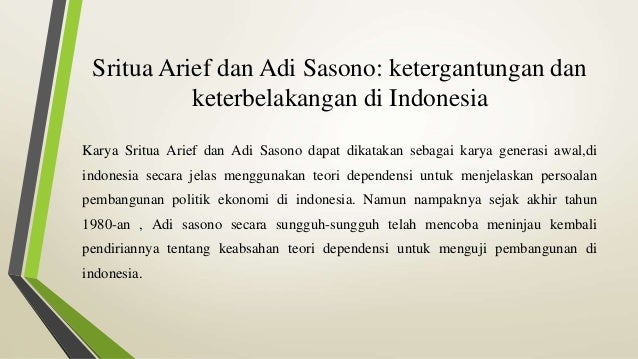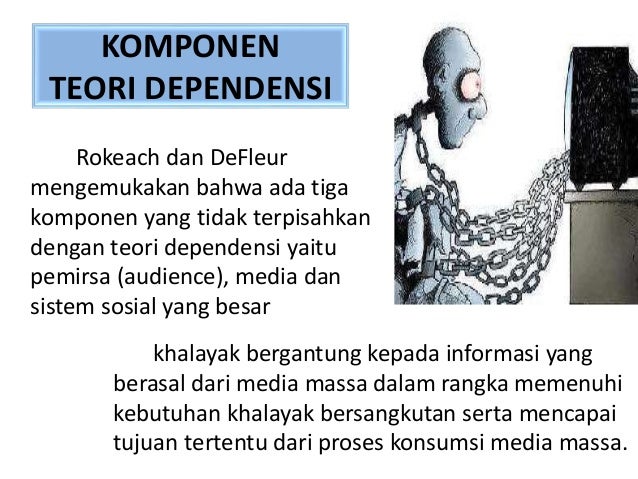Teori Dependensi Pdf
EVOLUSI TEORI KETERGANTUNGAN SISTEM MEDIA MENJADI TEORI INFRASTRUKTUR KOMUNIKASI
Teori dependensi dalam komunikasi massa mengulas secara singkat tentang kerangka kerja teori, konsep, prinsip, serta berbagai kelebihan dan kekurangan yang dimiliki. Periferi; 3.4 Eksternal. 4 Perbandingan teori dependensi dengan teori sistem dunia; 5 Referensi. 'World Systems Theory' (PDF). Diakses tanggal 30.
Abstract
This article deals with a matter of evolution theory in the study of science communications. Object of theory discussed is Media System Dependency Theory which introduced by Ball-Rokeach. This article is focused to overview: 1). History of Media System Dependency Theory emergence. 2) Development phase of this theory; 3). Challenge for this MSD theory: Critique and Change of Time, and 4). From MSD toward Communication Infrastructure Theory (CIT).
Artikel ini mencoba membahas persoalan evolusi teori dalam studi ilmu komunikasi. Teori yang dijadikan objek bahasan adalah teori ketergantungan sistem media (MSD) dari Ball-Rokeach. Fokus persoalan yang dibahas dalam tulisan ini mencakup : 1) Riwayat Kemunculan Teori MSD; 2) Fase Perkembangan Teori MSD 3) Tantangan terhadap teori MSD: Kritik dan Perubahan Waktu dan 4) Dari MSD Menuju Communication Infrastructure Theory (CIT).
Keywords
References
Anderson, B. 2006. Imagined communities. London: New York : Verson.
Ball-Rokeach. 1974. The Information perspective. Paper presented at the Annual Meeting of the American Sociological Association, Montreal.
Ball-Rokeach & DeFleur. 1976. Dependency model of mass media effects. Communication Research, 3 (1).
Ball-Rokeach, dkk. 1984. The great American values test : Influencing behavior and belief through television. New York : Free Press.
Ball-Rokeach, S.J. 1985. The Origins of individual media system dependency : A Sociological framework. Communication Research, 12.
Ball-Rokeach .1998. A theory of media power and a theory of media uses : Different stories, questions, and ways of thinking. Hypocrisy 10 years chaos confusion rar. Mass Communication & Society, 1 (2).
Craig , Robert T., and Heidi I. Muller. 2007, Theorizing Communication-Reading Across Traditions, Los Angeles : Sage, p.63. Gerbner & Gross, 1976.
Emerson, R.M. 1962. Power-dependency relation. American Sociological Review, 27.
Gerbner, G., & Gross, L. 1976. Living with television: The violence profile. Journal of Communication, 26.
Halpern, P. 1994. Media dependency and political perceptions in the authoritarian political system. Journal of Communication, 44 (4).
Katz, E. 1957. The two step flow of communication: An up to date report, Public Opinion Quarterly, 21 (1).
Kim, Jung, & Ball-Rokeach. 2006. Civic engagement from a communication infrastructure perspective. Communication Theory, 16 (2). 123musiq tamil songs mp3 downloads.
Loges, W.E. 1994. Canaries in the coal mine: Perception of threat an dmedia system dependency relations. Communication Research, 21 (1).
Pitts, G. 2000. Democracy and press freedom in Zambia: Attitudeof members of Parliement toward media and media regulation. Communication Law and Policy, 5 (2).
Perloff, R. M. 2007. The dynamics of persuation: Communication and attitudes in the 21st century (3rd.). Hillsdale, NJ: Erlbaum
Robin L. Nabi & Mary Beth Oliver, The SAGE Handbook of Media Processes and Effects, p
Rubin dan Windahal (1986). The uses and dependency model of mass communication. Critical Studies in Mass Communication , 3 (2).
Schiller, H.J. 1973. Communication and Cultural domination. White Plains, NY: International Arts and Sciences Press.
Singhal & Rogers. 2002. A theoretical agenda for entertainment education. Communication Theory, 12 (2).
DOI: http://dx.doi.org/10.31445/jskm.2011.150207
Refbacks
- There are currently no refbacks.

__This work is licensed under a Creative Commons Attribution-NonCommercial-ShareAlike 4.0 International License.
Teori Dependensi Adalah
open wikipedia design.| Raúl Prebisch | |
|---|---|
| Lahir | 17 April 1901 San Miguel de Tucumán |
| Meninggal | 29 April 1986 (umur 85) Santiago de Chile |
| Kebangsaan | Argentina |
| Bidang | Ekonomi pembangunan |
| Mazhab | Ekonomi struktural |
| Alma mater | Universitas Buenos Aires |
| Kontribusi | Tesis Singer–Prebisch |
Raúl Prebisch (17 April 1901 – 29 April 1986) adalah ekonomArgentina yang dikenal atas kontribusinya terhadap ekonomi strukturalis seperti hipotesis Prebisch–Singer. Hipotesis tersebut menjadi dasar teori dependensi ekonomi. Ia kadang dianggap sebagai ekonom Neo-Marxis.
Sebelum rezim Augusto Pinochet berkuasa di Chili, arah ekonomi negara ini didasarkan pada gagasan-gagasan Presbisch.[1]

Karya[suntingsunting sumber]
- Prebisch, Raúl (1959). 'Commercial Policy in the Underdeveloped Countries'. American Economic Review. 49: 251–273.
- Raúl Prebisch, The Economic Development of Latin America and Its Principal Problems (New York: United Nations, 1950)
Lihat pula[suntingsunting sumber]
Referensi[suntingsunting sumber]
- ^. 33: 1941–1949. doi:10.2307/2729318. JSTOR2729318.Tidak memiliki atau tanpa
title=(bantuan)
Bacaan lanjutan[suntingsunting sumber]
- John Toye and Richard Toye (2006), Raúl Prebisch and the Limits of Industrialization. In Dosman E.J. (ed.) Raúl Prebisch: Power, Principle, and the Ethics of Development, IDB-INTAL.
- Toye, John; Toye, Richard (2003). 'The origins and interpretation of the Prebisch-Singer thesis'(PDF). History of Political Economy. 35 (3): 437–467. doi:10.1215/00182702-35-3-437.
- Love, Joseph L. (1980). 'Raúl Prebisch and the Origins of the Doctrine of Unequal Exchange'. Latin American Research Review. 15: 45–72.
- Flechsig, Steffen (1999), 'Raul Prebisch's Contribution to a Humane World' in Global capitalism, liberation theology, and the social sciences: An analysis of the contradictions of modernity at the turn of the millennium (Andreas Mueller, Arno Tausch and Paul Zulehner (Eds.)), Nova Science Publishers, Hauppauge, Commack, New York
- Dosman, Edgar J. (2008), The Life and Times of Raúl Prebisch, 1901–1986, McGill-Queen's University Press, Montreal, Kingston
Pranala luar[suntingsunting sumber]
- Paul Berthoud, A Professional Life Narrative, 2008, worked with Raúl Prebisch in CEPAL and UNCTAD, and offers testimony from the inside.
- Raúl Prebisch: Latin America's Keynes, The Economist, Mar 5th 2009
- Profile at The International Institute of Social Studies (ISS)
This page is based on a Wikipedia article written by contributors (read/edit).
Text is available under the CC BY-SA 4.0 license; additional terms may apply.
Images, videos and audio are available under their respective licenses.
